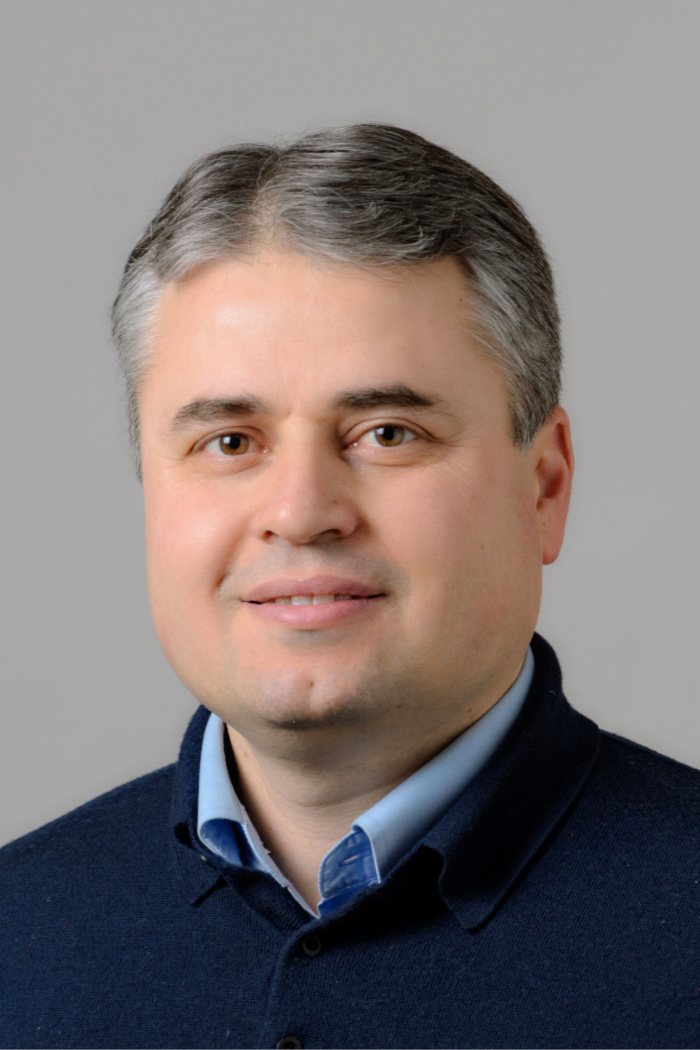Necmi Biyikli
Associate Professor
Department of Electrical and Computer Engineering
Education:
- Ph.D, Electrical and Electronics Engineering, Bilkent University, 2004
- M.S., Electrical and Electronics Engineering, Bilkent University, 1996
- B.S., Electrical and Electronics Engineering, Bilkent University, 1992
Research Interests:
- Materials & Growth
-
- III-Nitride semiconductor materials (AlN, GaN, InN)
- III-Nitride thin-film growth (Plasma-enhanced atomic layer deposition, MOCVD)
- Metal-Oxide semiconductor materials (ZnO, TiO2, SnO2)
- Metal-Oxide thin-film growth (DC/RF-Sputtering, atomic layer deposition)
- Piezo-electric thin-films (AlN, ZnO)
- Tunable/smart alloys (Phase change – GST / Tunable dielectric – BST)
- Durable materials (BN)
- Devices & Applications
-
- Opto-electronics: Photodetectors, LEDs based on III-Nitride compounds
- Electronics: High-power/high-frequency III-Nitride transistors, thin-film transistors (TFTs)
- Renewable energy: Inorganic solar cells, hybrid organic/inorganic solar cells, dye synthesized solar cells (DSSC)
- Sensing: Chemical/gas sensors for environmental monitoring using ZnO/SnO2/TiO2 nanostructures and ZnO/AlN SAW sensors
- Wireless communication: Novel materials & architectures for next-generation smart/green wireless communication systems
- Functional surfaces: Photocatalytic coatings based on hybrid organic/inorganic nano-structures using ALD
- Health monitoring & Medical diagnosis: Biological sensors, micro-needles, Lab-on-a-Chip (LoC) devices & systems
- National security and defense: Reconfigurable RF-antenna systems for agile & secure communication systems
- Opto-electronics: Photodetectors, LEDs based on III-Nitride compounds
Awards and Honors
- 4 Student Finalist Awards by Biyikli Group members in Annual AVS-ALD Conferences (Boston, MA – 2011; San Diego, CA – 2013; Portland, OR – 2015; Denver, CO – 2017)
- Middle East Technical University (METU) Prof. Mustafa Necati Parlar Education and Research Foundation – Research Incentive Award (2013)
- European Research Executive Agency – Marie Curie Fellowship – International Re-integration Grant (MC-IRG) Award (2010)
Publications
- M. A. Khalily, N. Biyikli, et al.,“Facile synthesis of three-dimensional Pt-TiO2 nanonetworks: Highly active catalyst for hydrolytic dehydrogenation of ammonia borane”, Angewandte Chemie 55, 12257 (2016).
- A. Haider, N. Biyikli, et al.,“Low-temperature grown wurtzite InxGa1-xN thin films via hollow cathode plasma-assisted atomic layer deposition”, Journal of Materials Chemistry (C) 3, 9620 (2015).
- F. Kayaci, N. Biyikli, et al.,“Role of zinc interstitials and oxygen vacancies of ZnO in photocatalysis: A bottom-up approach to control the defect density”, Nanoscale 6, 10224 (2014).
- C. Ozgit-Akgun, N. Biyikli, et al., “Hollow-cathode plasma-assisted atomic layer deposition of crystalline AlN, GaN, and AlxGa1-xN thin films at low temperature”, Journal of Materials Chemistry (C) 2, 2123 (2014) [Front Cover Article]. Major breakthrough: A novel method for plasma-assisted ALD which enabled a dramatic decrease in impurity content of low-temperature-grown GaN thin films is proposed. Moreover, for the first time, the self-limiting growth for crystalline AlGaN alloys along with bandgap tuning is demonstrated.
- A. Haider, N. Biyikli, “Fabrication of BN/AlN bishell hollow nanofibers by electrospinning and atomic layer deposition”, APL Materials 2, 096109 (2014). Key contribution: A low-temperature process to fabricate multi-layered hollow crystalline BN/AlN nanostructures on polymeric nanofibrous templates is developed.
- S. Bolat, N. Biyikli, et al.,“Low temperature thin film transistors with hollow cathode plasma-assisted atomic layer deposition based GaN channels”, Applied Physics Letters 104, 243505 (2014). Major breakthrough: The lowest process temperature budget (growth and fabrication @ T<200°C) reported ever for GaN-based thin-film transistors by using our own hollow-cathode plasma-assisted ALD (HCPA-ALD) technique is achieved.
- C. Ozgit-Akgun, N. Biyikli, et al.,“Fabrication of flexible polymer-GaN core-shell nanofibers by the combination of electrospinning and hollow cathode plasma-assisted atomic layer deposition”, Journal of Materials Chemistry (C) 3, 5199 (2015). (Key advance: Fabricating flexible core-shell GaN nanofibers via low-temperature HCPA-ALD, which might have potential use in flexible electronics is succeeded)
- F. Kayaci, N. Biyikli, et al.,“Selective isolation of the electron or hole in photocatalysis: ZnO–TiO2 and TiO2–ZnO core-shell structured heterojunction nanofibres via electrospinning and atomic layer deposition”, Nanoscale 6, 5735 (2014) [Front Cover Article]. (Key contribution: Novel core-shell metal-oxide nanofiber structures demonstrating significantly improved photocatalysis performance)
- C. Ozgit, N. Biyikli, et al.,“Template-based synthesis of aluminum nitride hollow nanofibers via plasma-enhanced atomic layer deposition”, Journal of the American Ceramics Society 96, 916 (2013).
- C. Ozgit, N. Biyikli, et al.,“Self-limiting low-temperature growth of crystalline AlN thin films by plasma-enhanced atomic layer deposition”, Thin Solid Films 520, 2750 (2012). Major breakthrough: The self-limiting growth of crystalline AlN thin films at extremely low temperatures down to 100°C is accomplished.

| necmi.biyikli@uconn.edu | |
| Phone | 860-486-2666 |
| Mailing Address | 191 Auditorium Road Storrs, CT 06269 |
| Office Location | ITE 459 |
| Campus | Storrs |